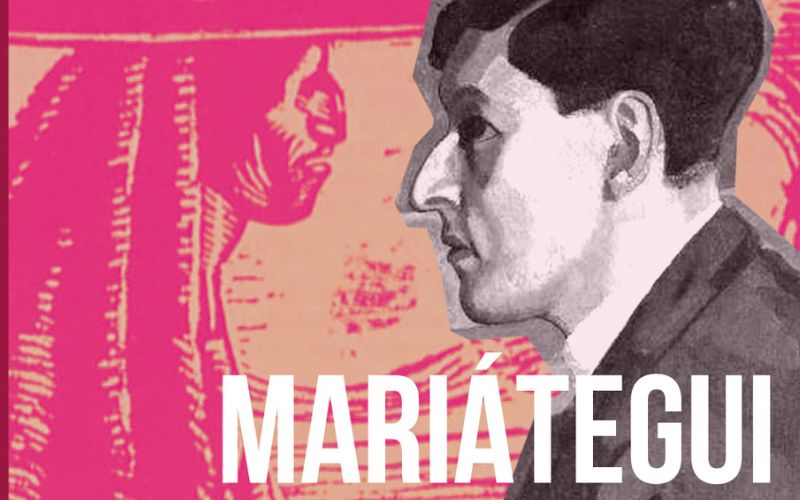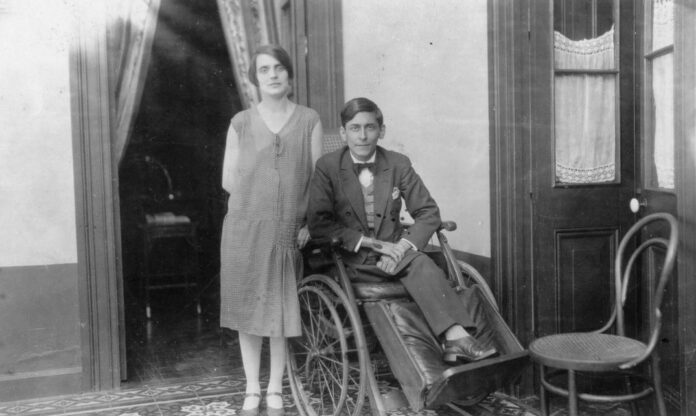You will come again in the dew of life in the laughter of the blacks by the sea in the fields
distributed among Indians in the national happiness of women you will come again
in the land for the peasants in the factory to the worker in the water and health for all
and in the living alphabet of books.
To José Carlos Mariátegui, Gustavo Valcárcel (1955)
José Carlos Mariátegui, the Amauta, lost his life at the young age of 35 and left an inescapable theoretical and political legacy for the emancipatory projects of Our America and the world¹. This small gesture to a great revolutionary does not seek to be a melancholic memory, but rather a recovery of the vitality of the being and doing of Mariátegui, because when it comes to drawing up a praxis with the capacity of impacting reality, it is necessary to make use of all the practical and theoretical tools provided by our people and by our organic intellectuals.
Mariátegui’s intellectual production is faithful to its time. However, his thinking transcends the few years of his life, running the borders of time to whisper to those who want to hear the keys to interpreting and transforming reality. By way of presentation, we want to highlight five great legacies—among many others—that Mariátegui left behind, which remain fully valid despite having been written a hundred years ago.
Against positivism: for a new socialist rationality
Mariátegui was born in Moquegua (Peru) on 14 June 1894, and spent most of his life in a context of strong systemic convulsions: the end of the hegemony of liberalism, the debacle of the Enlightenment and positivism as a system of ideas, the First World War and the interwar period, the economic crisis, the fall of the old European empires and the emergence of titans like communism and the fascist monster.
At an early age, he suffered from tuberculosis arthritis, rickets, and an accident at age eight in school that prevented him from continuing his formal studies, condemning him to a childhood bedridden in a hospital. These circumstances will later be the cause of the amputation of one of his legs. However, Mariátegui’s will was not subdued: he becomes an avid self-taught reader and then begins a path in journalism that accompanies him throughout his work, intellectual and political life.
His sensitivity to the cause of the oppressed, his closeness to the literary avant-garde and intellectual circles of Peru, and a pro-indigenous and anti-gamonal² militancy forced him into exile in 1919, under the government of Augusto Leguía. Installed in Italy, Mariátegui embraces the ideas of Marxism from a particular angle, seduced by the spirit of the European epic, the interwar zeitgeist: a Marxism stripped of positivist, deterministic and economistic elements.
As a contemporary of Gramsci, Lukács, Bloch, Brecht, and Luxemburg, and a scholar of Sorel, Gobetti, and Croce, Amauta highlights the potential of Marxism as a creative and critical method that, situated in concrete processes and through its meticulous analysis, enables revolutionary praxis. This way of understanding reality makes Mariátegui the father of Latin American Marxism and a cornerstone of emancipatory thought.
From his first travels, Mariátegui draws a valuable lesson: the need to combine the meticulous analysis of reality with the exaltation of the creative potential of human praxis, highlighting the particular configuration of the social and class formations of each reality. In this key, the article ‘Anniversary and Balance Sheet’, compiled in this book, points to his already immortalized statement: ‘We certainly do not want socialism in Latin America to be a copy or imitation. It should be a heroic creation’; it’s an invitation not to repeat recipes and to think where your feet step, adopting a particular sensitivity for our culture, traditions, history, and the correlation of forces specific to the context of Our America.
“Amauta highlights the potential of Marxism as a creative and critical method that, situated in concrete processes and through its meticulous analysis, enables revolutionary praxis”
Invitation to a Heroic Life: the Myth
From this first great lesson derive the following contributions from Amauta. His rejection of positivism does not distance Mariátegui from the optimism of the will. On the contrary, it reinforces his hopes in the emancipatory promises of the project of Enlightenment. It does not place its lens on structural determinants of historical development, but instead analyses the actions of the people: What mobilizes the oppressed classes? Where do they get the conviction, the strength to face an unequally more powerful enemy? What brings them to organize collectively? Here, Mariátegui finds a mobilizing concept, the myth³: the myth that provides the images, the force that mobilizes the profound self and transcends what exists, inviting to a heroic life. Mariátegui does not discard the idea of the rationality of the modern project but instead points out the power of myth in creating alternative rationality, worthy of an authentic life.
The myth renews the community’s ties and provides common codes of interpretation and intervention in reality, which is why, at some point, it is what produces the community. However, myth should not be understood as a fictional construction, a ‘deception’ that allows for the instrumental utilization of the masses: it emanates from the history of each people. It is the tense but inseparable articulation ofmillennial tendencies and emerging processes. For people’s organizations, it is about understanding the mobilizing force of the myth of our people and not about creating a new myth alien to popular sensibilities.

The Subaltern classes in Latin America: the problem of the indian
Mariátegui is a witness to a period of constant indigenous uprisings in Peru. Stripped of their lands, semi-enslaved under the gamonal system, and permanently under violence, many communities led rebellions and joined causes with the labour and student movements and the intelligentsia. As a contemporary of González Prada, Valcárcel, and Ugarte, Mariátegui carefully follows ‘the problem of the Indian’⁴. Moreover, in this intellectual climate he revitalizes the thesis of Inca communism, not as a restoration of a lost idyllic past, but as part of the national and Andean cultural matrix: the study of the Peruvian reality is inseparable from the question of the Indian.
Amauta recognizes the potential of an indigenous subject without abandoning the class perspective. Rejecting determinism and evolutionism, he understands the heterogeneity of oppressed subjects and proposes to articulate to the labour movement, the indigenous, student, peasant struggles, and even the women’s struggle. An example of the latter is found in the article compiled here, ‘Feminist Demands’ (1924), which is very innovative within the context in which it was written. Mariátegui does not essentialize a revolutionary subject, but instead discovers transformative potential in subalternity, in the multiplicity of experiences of the oppressed and, above all, in their capacity for agency, in their will for emancipation, to the extent that this power is found anchored in the subjects’ history.
The Profound Self: a new Socialist Ethics
Mariátegui’s legacy is also linked to his disdain for the empty shell that life offers under the logic of instrumental rationality. What does socialism have to offer to our peoples? What does socialism have to offer to a worker, a peasant, a young woman, an Indian? Mariátegui believes profoundly in the need for a horizon of hope as the driving force of a new civilizational project and new rationality that allows the societal fabric to be recomposed, guided by a new socialist ethic. For this reason, the Peruvian intellectual does not propose a surgical separation between the society of now and a future society. Instead, he values prefigurative experiences and exalts the weight of collective subjectivity as carriers of a true socialist ethics. Recuperating the historical character of praxis in Inca communities, he offers economic, social, and political alternatives typical of the Indo-American people to dispute the daily forms and contents of the ruling classes, in a kind of dialectic between the past and the future.
“Mariátegui believes profoundly in the need for a horizon of hope as the driving force of a new civilizational project and new rationality that allows the societal fabric to be recomposed, guided by a new socialist ethic”
The article ‘Ethics and Socialism’ (1928), which in the middle of an open polemic with revisionists of his time, highlights the ethical component of the socialist project. This key invites us to think: What is the ethical content of our political project? What are the elements of practical socialism in our daily work, in our base’s militancy, in our territories, in our organization?
Internationalist Nationalism: forging a situated left
In a famous book about Mariátegui, Flores Galindo⁵ indicates that the experience of exile generated two ideas in Amauta: defence of the national and the need for internationalism. Mariátegui is not only an avid international expert and analyst but on his return to Peru in 1923 commits himself to strengthen the organization of the subaltern classes on an international scale: contributing to the Red International of Labour Unions and the Third Communist International. Despite sustaining serious differences with the stagist and standardized approaches of the Third International, he continues to intervene in it as a really existing organization of the international left, which is why he receives strong criticism from Aprismo⁶. This is proof of his anti-sectarianism and a fully comprehensive vision of the historical moment since a political force that lacks geopolitical perspective and supranational strategy is short-sighted and is destined to run into the same stone again and again, until falling.
Mariátegui’s internationalism is combined with the prevailing need to understand national processes. His journalistic collaboration in the magazine Mundial is part of this legacy, assiduously writing the section ‘Let’s Peruvianize Peru’. The generalization of the State form as a mode of organization and social domination forces him to understand the national processes for a successful political intervention and, in this sense, he rejects numerous proposals of the Third International that propose the same form of political intervention in the different national realities that made up the International.
The legacies we list are just an arbitrary sampling of Amauta’s prolific work. His thinking and practice maintain an enormous validity and teach us to de-essentialize political processes, placing the focus on the reality in which we live, and to put our greatest organizational and human effort into living a heroic life in pursuit of a new socialist rationality.
Lucía Reartes and Yael Ardiles are members of the José Carlos Mariátegui School, oriented to the formation of popular movements and whose headquarters are in Argentina. The text published here is part of the book Mariategui jointly edited by Batalla de Ideas (Argentina), Expressão Popular (Brazil), Leftword Books (India), Chintha Publishers, Vaam Prakashan, Bharati Puthakalayam and the Tricontinental Institute of Social Research. Download the complete book here.
References
1) Mariátegui was nicknamed ‘Amauta’, the name of the magazine that he founded in 1926. Amauta (amawt’a) comes from Quechua—the language of the Inca people—and means ‘teacher’ or ‘wise one’.
2) Gamonalismo was the name adopted by the oligarchic regime in Peru. Creole landowners, who did not come from a caste of colonial approval, who expanded their estates and their socio- political power by expropriating land from indigenous ayllus (family clans) with violent methods, were called ‘gamonal’.
3) This concept comes from the readings of the French philosopher Georges Sorel, but is reinterpreted and qualified by Mariátegui.
4) This is the title of the famous second section of the book Seven Interpretive Essays on Peruvian Reality, published for the first time in 1928, in Lima.
5) We refer to La agonía de Mariátegui: la polémica con la Komintern [‘Mariátegui’s Agony: The Controversy with the Comintern’], the book by Alberto Flores Galindo.
6) The Latin American Popular Revolutionary Alliance (APRA) was created in 1924 by Víctor Raúl Haya de la Torre. Mariátegui and a group of militants and close intellectuals were part of it, but their differences grew, leading to a rupture in 1928.








